

Wu wei. Wu wei (Chinese: 無爲; a variant and derivatives: traditional Chinese: 無為; simplified Chinese: 无为; pinyin: wú wéi; Japanese: 無為; Korean: 무위; Vietnamese: Vô vi; English, lit. non-doing) is an important concept in Taoism that literally means non-action or non-doing.
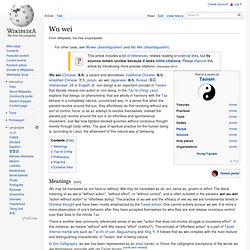
In the Tao te Ching, Laozi explains that beings (or phenomena) that are wholly in harmony with the Tao behave in a completely natural, uncontrived way. In a sense that when the planets revolve around the sun, they effortlessly do this revolving without any sort of control, force, or as an attempt to revolve themselves, instead the planets just revolve around the sun in an effortless and spontaneous movement. Just like how fighters blocked punches without conscious thought merely through body reflex. The goal of spiritual practice for the human being is, according to Laozi, the attainment of this natural way of behaving.
Righteousness. Righteousness (also called rectitude) is an important theological concept in Hinduism, Christianity, Judaism and Islam.
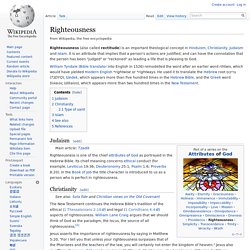
It is an attribute that implies that a person's actions are justified, and can have the connotation that the person has been "judged" or "reckoned" as leading a life that is pleasing to God. William Tyndale (Bible translator into English in 1526) remodelled the word after an earlier word rihtwis, which would have yielded modern English *rightwise or *rightways. He used it to translate the Hebrew root צדקים (TzDYQ), tzedek, which appears more than five hundred times in the Hebrew Bible, and the Greek word δίκαιος (dikaios), which appears more than two hundred times in the New Testament.
Flow... Diligence. Plate 1 of classical virtues: Diligence.
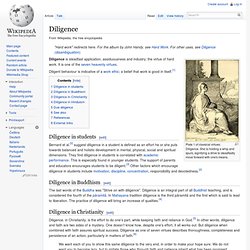
She is holding a whip and spurs, signifying a drive to steadfastly move forward with one's means. Diligence is steadfast application, assiduousness and industry; the virtue of hard work. It is one of the seven heavenly virtues. Diligent behaviour is indicative of a work ethic; a belief that work is good in itself.[1] Diligence in students[edit] The purpose of a system is what it does. The purpose of a system is what it does, (often shortened to POSIWID) is a systems thinking heuristic coined by Stafford Beer.
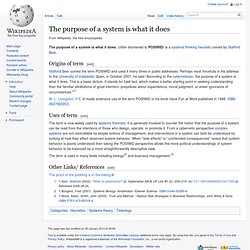
Origins of term[edit] Stafford Beer coined the term POSIWID and used it many times in public addresses. Force (Star Wars) Fictional energy source in Star Wars Concept and development[edit] Creation for the original films[edit]
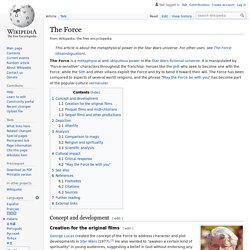
Mitochondrion. Two mitochondria from mammalian lung tissue displaying their matrix and membranes as shown by electron microscopy History[edit] The first observations of intracellular structures that probably represent mitochondria were published in the 1840s.[13] Richard Altmann, in 1894, established them as cell organelles and called them "bioblasts".[13] The term "mitochondria" itself was coined by Carl Benda in 1898.[13] Leonor Michaelis discovered that Janus green can be used as a supravital stain for mitochondria in 1900.
Friedrich Meves, in 1904, made the first recorded observation of mitochondria in plants (Nymphaea alba)[13][14] and in 1908, along with Claudius Regaud, suggested that they contain proteins and lipids. Benjamin F. Kingsbury, in 1912, first related them with cell respiration, but almost exclusively based on morphological observations.[13] In 1913 particles from extracts of guinea-pig liver were linked to respiration by Otto Heinrich Warburg, which he called "grana". Qi. Etymology[edit] The etymological explanation for the form of the qi logogram (or chi) in the traditional form 氣 is "steam (气) rising from rice (米) as it cooks".

The earliest way of writing qi consisted of three wavy lines, used to represent one's breath seen on a cold day. A later version, 气, identical to the present-day simplified character, is a stylized version of those same three lines. For some reason, early writers of Chinese found it desirable to substitute for 气 a cognate character that originally meant to feed other people in a social context such as providing food for guests.
[citation needed] Appropriately, that character combined the three-line qi character with the character for rice. Qi Journal Homepage. Hyperfocus. Hyperfocus is an intense form of mental concentration or visualization that focuses consciousness on a subject, topic, or task.
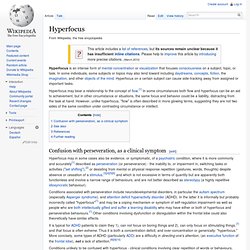
In some individuals, some subjects or topics may also tend toward including daydreams, concepts, fiction, the imagination, and other objects of the mind. Hyperfocus on a certain subject can cause side-tracking away from assigned or important tasks. Confusion with perseveration, as a clinical symptom[edit] Conditions associated with perseveration include neurodevelopmental disorders, in particular the autism spectrum (especially Asperger syndrome), and attention deficit hyperactivity disorder (ADHD). Will (philosophy) One of the recurring questions discussed in the Western philosophical tradition since Christianization is the question of "free will", and the related but more general notion of fate, which asks how will can be truly free if the actions of people have natural or divine causes which determine them, but which are not really under the control of people.
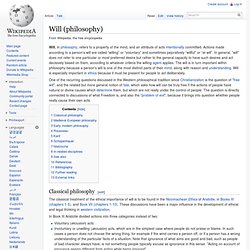
The question is directly connected to discussions of what Freedom is, and also the "problem of evil", because it brings into question whether people really cause their own acts. The classical treatment of the ethical importance of will is to be found in the Nicomachean Ethics of Aristotle, in Books III (chapters 1-5), and Book VII (chapters 1-10). These discussions have been a major influence in the development of ethical and legal thinking in western civilization. In Book III Aristotle divided actions into three categories instead of two: Volonté (philosophie) Un article de Wikipédia, l'encyclopédie libre.
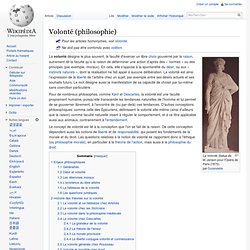
Pour les articles homonymes, voir Volonté. Ne doit pas être confondu avec volition. La Volonté. Statue de M. Janson pour l'Opéra de Paris (1875). par Durandelle La volonté désigne le plus souvent, la faculté d'exercer un libre choix gouverné par la raison, autrement dit la faculté qu'a la raison de déterminer une action d'après des « normes » ou des principes (par exemple, moraux). Pour de nombreux philosophes, comme Kant et Descartes, la volonté est une faculté proprement humaine, puisqu'elle transcende les tendances naturelles de l'homme et lui permet de se gouverner librement, à l'encontre de (ou par-delà) ces tendances. Force (vertu) Un article de Wikipédia, l'encyclopédie libre.
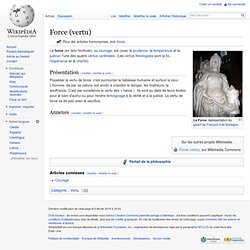
Pour les articles homonymes, voir force. Sur les autres projets Wikimedia : Force (vertu), sur Wikimedia Commons Portail de la philosophie. Force @ HOLOS GLOBAL SYSTEM. Being in itself is the force. The action of being is the manifestation of its force. The force depends on the form while the aim of the action is an even greater force. Action in itself liberates the force. Every reactive action provokes other actions.